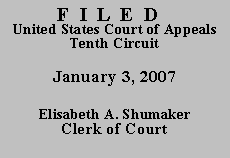

| ROBERT DALE MARTIN, |
|
| v. | |
| HECTOR A. RIOS, Warden, |
Robert D. Martin, pro se.
Troy A. Eid, United States Attorney, and John M. Hutchins, Assistant United
States Attorney, Denver, Colorado, for Respondent - Appellee
Mr. Martin is serving a 27-month sentence for a conviction as a felon in possession of a firearm under 18 U.S.C. § 922(g). On July 27, 2006, he filed an application for habeas relief under 28 U.S.C. § 2241 in the United States District Court for the District of Colorado. The district court denied his application. Although he did not file a notice of appeal, we consider his "Motion for Certificate of Appealability § 2253," filed in the district court on September 27, 2006, to be the functional equivalent of a notice of appeal. See Rodgers v. Wyo. Att'y Gen., 205 F.3d 1201, 1204 (10th Cir. 2000). We have jurisdiction under 28 U.S.C. § 1291. See McIntosh v. U.S. Parole Comm'n, 115 F.3d 809, 810 n.1 (10th Cir. 1997) ("[A] certificate of appealability . . . is not required in order to appeal a final order in a [federal prisoner's] proceeding under 28 U.S.C. § 2241."). We review de novo the denial of Mr. Martin's § 2241 application. See Bradshaw v. Story, 86 F.3d 164, 166 (10th Cir. 1996).
Mr. Martin claims that the BOP improperly denied him a sentence reduction under 18 U.S.C. § 3621(e)(2)(B), which states that "[t]he period a prisoner convicted of a nonviolent offense remains in custody . . . may be reduced" after successful completion of a substance-abuse treatment program. As the use of the word may indicates, the provision grants the BOP discretion to determine which prisoners convicted of nonviolent offenses are eligible for a sentence reduction. See Lopez v. Davis, 531 U.S. 230, 241 (2001). The BOP exercised that discretion in adopting 28 C.F.R. § 550.58, which states that an inmate is not eligible for early release, despite having been sentenced for a nonviolent offense and having completed a substance-abuse program, if the offense was a felony "[t]hat involved the carrying, possession, or use of a firearm." 28 C.F.R. § 550.58(a)(1)(vi)(B).
This BOP regulation was upheld by the Supreme Court in Lopez, 531 U.S. at 244. In Lopez the prisoner had been convicted of possession with intent to distribute methamphetamine and had also possessed a firearm at the time of the offense. See id. at 236. While incarcerated he received substance-abuse treatment but was denied a sentence reduction under 28 C.F.R. § 550.58(a)(1)(vi). See id. In affirming the BOP's denial of a sentence reduction, the Court reasoned that the BOP's "denial of early release to all inmates who possessed a firearm in connection with their current offense rationally reflects the view that such inmates displayed a readiness to endanger another's life." Id. at 240.
Mr. Martin appears to believe that the BOP's denial of a sentence reduction was based on a determination that he had been convicted of a violent offense. But we need not address whether Mr. Martin's offense is a "nonviolent offense" under 18 U.S.C. § 3621(e)(2)(B). He was ineligible for a sentence reduction even if his offense was "nonviolent" because 28 C.F.R. § 550.58(a)(1)(vi)(B) unambiguously excludes prisoners whose current offense is a felony "[t]hat involved the carrying, possession, or use of a firearm."
Mr. Martin misreads Lopez insofar as he claims that it does not apply when the inmate's offense involved mere possession of a firearm. As indicated above, Lopez held that the BOP may categorically exclude prisoners under 28 C.F.R. § 550.58(a)(1)(vi) based on "possess[ion of] a firearm in connection with their current offense." 531 U.S. at 240. This is precisely the situation here. Mr. Martin cannot challenge the applicability of the regulation by relying on our decision rejecting the regulation in Ward v. Booker, 202 F.3d 1249, 125657 (10th Cir. 2000); cf. Fristoe v. Thompson, 144 F.3d 627, 632 (10th Cir. 1998) (rejecting earlier BOP program statement), because that decision preceded Lopez and is no longer good law on this point. Indeed, our judgment in Ward was vacated by the Supreme Court in light of Lopez. See Booker v. Ward, 531 U.S. 1108 (2001).
We AFFIRM the district court's judgment. We also DENY Mr. Martin's Motion for Leave to Proceed on Appeal Without Prepayment of Costs or Fees.
*.After examining the briefs and appellate record, this panel has determined unanimously that oral argument would not materially assist the determination of this appeal. See Fed. R. App. P. 34(a)(2); 10th Cir. R. 34.1(G). The case is therefore ordered submitted without oral argument.